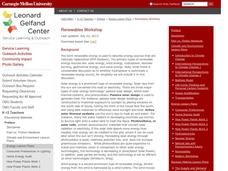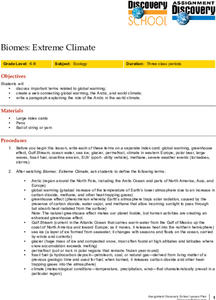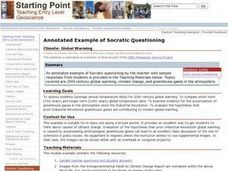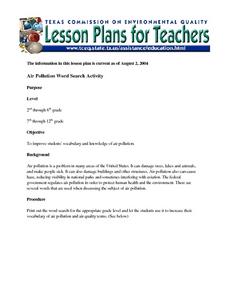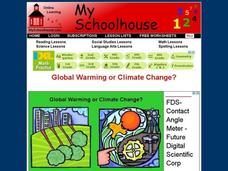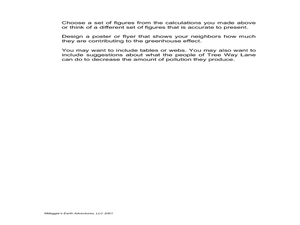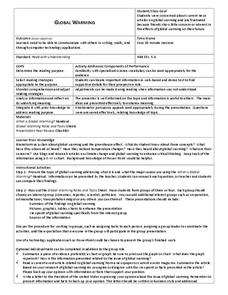Chicago Botanic Garden
Personal Choices and the Planet
How big is your footprint? Activity three culminates the series by having groups complete carbon footprint audits with people in their schools and/or around the districts. Groups then gather their data, create a presentation including...
Chicago Botanic Garden
Calculating Your Ecological Footprint
You can lower your ecological footprint by recycling! Lesson four in this series of five has individuals, through the use of a computer, calculate their ecological footprints. Through discussions and analysis they determine how many...
Curated OER
Atmospheric Chemistry
If you need a comprehensive review of the development of Earth's atmosphere through the ages, then this is for you! The presentation starts with a introduction to theories of planet formation and initial distribution of isotopes in the...
Teach Engineering
Efficiency of a Water Heating System
Tired of waiting for hot water? Groups of three determine the efficiency of an electric water-heating device. They calculate the amount of energy it takes to heat the water and the theoretical amount of energy required to heat the water....
Carnegie Mellon University
Renewables Workshop
Youngsters examine resource maps to find out which states are using solar and wind power and discuss as a class various other renewable energy sources. They use a provided data table to record pros and cons to each technology, build and...
Global Oneness Project
Protecting Wilderness
Would you live in a tree for three years to protect a redwood forest? Viewers of Rainhouse Cinema's Among Giants documentary consider the actions of Earth First! environmental activists who moved into the treetops of a grove of giant...
Teach Engineering
Efficiency of an Electromechanical System
How efficient is a motor in a LEGO set? Future engineers conduct an activity where a LEGO motor-generator system raises an object to a specified height. They then show what they learned and use their measurements to calculate the energy...
Curated OER
The Goldilocks Principle: A Model of Atmospheric Gases
Students discuss the characteristics of the Goldilocks Principle. They discover the pressure and chemical composition of Venus and Mars. They discuss how the Earth's temperature is affected by the atmosphere.
Curated OER
Biomes: Extreme Climate
Students create a web connecting global warming, the Arctic, and wold climate. They write a paragraph explaining the role of the Arctic in world climate.
Curated OER
Annotated Example of Socratic Questioning: Climate: Global Warming
Students compare and discuss short-term and longer-term global temperature data. They evaluate data from three sets of graphs and then participate in a structured whole class Socratic discussion on the possible causes of climate change.
Curated OER
Climate change in Canada
Students investigate the impact of human activity on the environment. In this secondary math/science lesson plan, students analyze and interpret information from data and graphs as they investigate trends in climate change and the...
Curated OER
Climate Change Quiz
In these climate change worksheets, students read through the fourteen questions about climate change. Students select the correct answer to complete the quiz.
Curated OER
Carbon Dioxide Heats It Up
Students design an investigation to test whether vegetation in an area helps regulate the ambient air temperature. They make comparisons between the investigation and global changes in climate. In groups, they present their findings to...
Curated OER
Air Pollution Word Search Activity
Students examine the issues surrounding air pollution. They discover how it affects peoples health and the government's regulations. They complete a word search activity to practice the vocabulary.
My Schoolhouse
Global Warming or Climate Change?
In this online interactive global warming and climate change learning exercise, students respond to 10 multiple choice questions regarding the information included in the provided paragraphs.
Curated OER
Global Warming or Climate Change?
In this online interactive global warming and climate change learning exercise, students respond to 10 multiple choice questions regarding the information included in the provided paragraphs.
Curated OER
The Big Burp:A Bad Day in the Paleocene
Learners describe the overall events that occurred during the Paleocene extinction event as well as the processes that are believed to result in global warming after group research. They infer how a global warming event could have...
Curated OER
The Big Burp: Where's the Proof.
Students explore the Cambrian explosion and Paleocene extinction events. In this climate change lesson plan, students read articles to link evidence they find to extinction and climate change. Links to the articles are included in the...
Curated OER
Carlyle Figures It Out
In this money worksheet, students read a passage titled Carlyle Figures It Out and completes word problems about it. Students complete 2 word problems and answer 2 opinion questions.
Curated OER
Climate Change
In these science worksheets, 5th graders explore aspects of weather and recycling. In the first worksheet, students are given five questions about weather which they match to the statement about weather that corresponds to it. In the...
Curated OER
Global Warming
Learners explore global warming. In this science lesson, students research global warming. Learners work in small groups to create a presentation about global warming.
Curated OER
The Rubber Band Air Test
Students complete an experiment to determine how dirty the air is in their local community. They analyze images and discuss the varying degrees of air pollution. They discuss the results of the experiment.
Curated OER
The Awful Eight
Students investigate the concept of a carpool and its contributions to either reducing or increasing air pollution. They conduct research using a variety of resources for background information. The information is used to write a play...
Curated OER
Review For Weather Quiz 2
In this science worksheet, students look at the information carefully in preparation for a formal assessment. The focus is upon defining different aspects of air masses.






